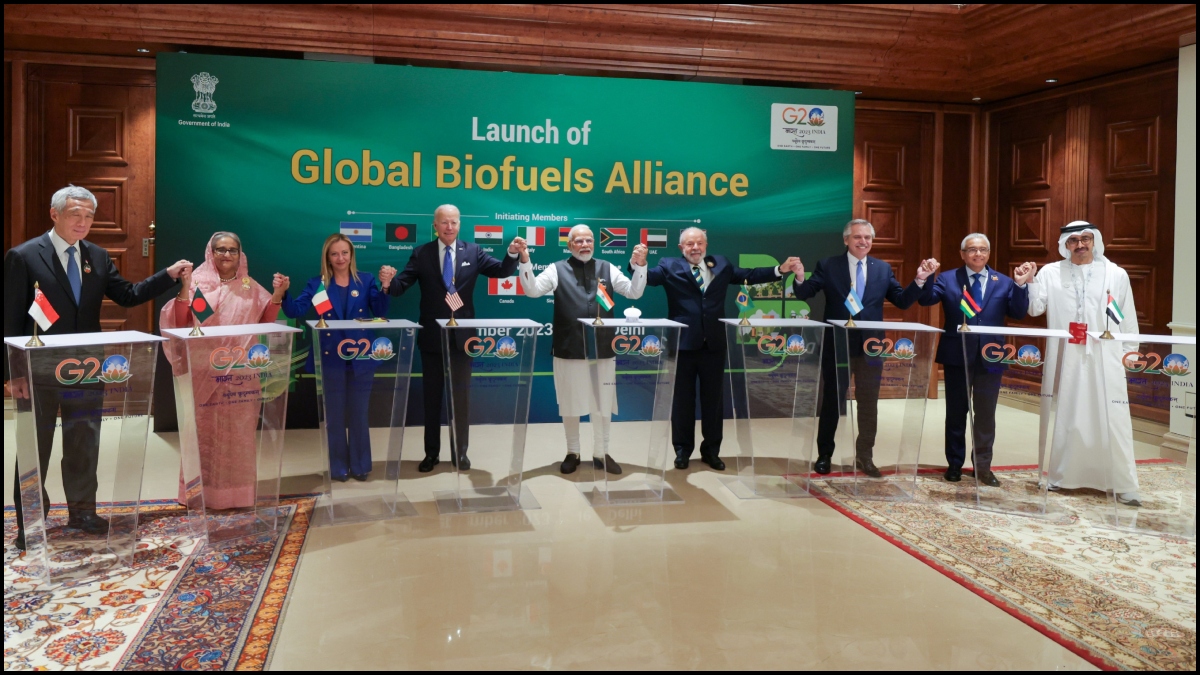G20 Summit 2023: Prime Minister Narendra Modi on Saturday launched the Global Biofuels Alliance on the sidelines of the G20 Summit in the presence of Biden, Brazilian President Luiz Inacio Lula da Silva, Bangadesh Prime Minister Sheikh Hasina, Italian Prime Minister Giorgia Meloni and others.
“The launch of the Global Biofuels Alliance marks a watershed moment in our quest towards sustainability and clean energy. I thank the member nations who have joined this Alliance,” said PM Modi in a post on X (formerly Twitter).
Brazil, India, and the United States, as leading biofuel producers and consumers, will work together during the next few months towards the development of a Global Biofuels Alliance along with other interested countries. The initiating member-countries included Argentina, Mauritius, South Africa, the United Arab Emirates (UAE) and the United States, while Singapore and Canada served as observer countries.
Earlier in the day, PM Modi also proposed the ‘G20 Satellite Mission for Environment and Climate Observation’ and urged leaders to partake in the ‘Green Credit Initiative’
“Today, the need of the hour is that all countries should work together in the field of fuel blending. Our proposal is to take an initiative at a global-level to take ethanol blending in petrol up to 20 per cent,” he said.
What is the Global Biofuels Alliance?
The Alliance seeks to intensify the use of sustainable biofuels, including in the transportation sector and facilitate cooperation. It will focus on facilitating global biofuels trade, concrete policies on lesson sharing, strengthening markets and provide technical support for biofuels programmes across the world.
It will work in collaboration with regional and international agencies as well as complement in the bioenergy, bioeconomy, and energy transition fields more broadly, like the Clean Energy Ministerial Biofuture Platform, the Mission Innovation Bioenergy initiatives, and the Global Bioenergy Partnership (GBEP).
The alliance will have a three-category membership structure bringing together member countries, partner organisations and industries. The alliance operations also include identifying the best global practices for development of sustainable biofuels and bioproducts.
The Global Biofuels Alliance, mirrors the International Solar Alliance (ISA) piloted by India and France in 2015 to bring clean and affordable solar energy within the reach of all. It will help India’s transition to alternative fuels and cutting its import bill, as part of efforts of the country to achieve net-zero carbon emissions by 2070.
At present, India imports 85% of its crude oil needs, but is working on building its capacity to produce fuel from such items as crop stubble, plant waste, and municipal solid waste.
PM Modi highlighted the need for energy transition
The Prime Minister highlighted that countries are in increasing need of energy transition in the 21st century in lieu of the challenges posed by climate change and any action would require trillions of dollars.
“Along with India, all the countries of the Global South are pleased that developed countries have taken a positive initiative this year, in 2023. Developed countries have expressed their willingness to fulfil their commitment of USD 100 billion for climate finance for the first time,” he said.
In the New Delhi G20 Leaders’ Declaration, world leaders recognised the the importance of sustainable biofuels in zero and low- emission development strategies. It also called on reliable, diversified, sustainable and responsible supply chains for energy transitions, including for critical minerals and materials beneficiated at source, semiconductors and technologies.
“We commit to accelerating clean, sustainable, just, affordable and inclusive energy transitions following various pathways, as a means of enabling strong, sustainable, balanced and inclusive growth and achieve our climate objectives,” read the declaration.
The International Energy Agency estimated in a previous report in July that global sustainable biofuels production would need to triple by 2030 to put the world’s energy system on track towards net zero emissions by 2050.
(with agencies input)
ALSO READ | G20 leaders condemned terrorism in all forms and recognised it as a serious threat to gloabl peace: Jaishankar
Latest India News



